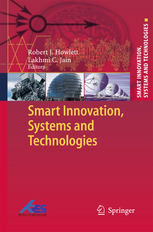We participate at the 18th International KES Conference on AGENTS AND MULTI-AGENT SYSTEMS: TECHNOLOGIES AND APPLICATIONS, KES-AMSTA-24. KES-AMSTA is an international scientific conference for research in the field of agent and multi-agent systems. Agents and multi-agent systems are related to a modern software paradigm which has long been recognized as a promising technology for constructing autonomous, complex and intelligent systems. Consisting of keynote talks by experts in the field, oral and poster presentations, AMSTA-24 will provide an excellent opportunity for researchers to discuss modern approaches and techniques for agent and multi-agent systems and their applications, as well as intelligent systems in the field of social networks, self-organisation and trust.
Proceedings
The conference proceedings will be published by Springer as book chapters in a volume of the KES Smart Innovation Systems and Technologies series, submitted for indexing in Scopus and Thomson-Reuters Conference Proceedings Citation Index (CPCI) and the Web of Science.
Smart Digital Futures
Smart Digital Futures 2024 is a multi-conference event co-locating five conferences on leading edge smart systems topics in a beautiful location. One conference fee gives you entry to six high-quality conferences on Innovation in Medicine and Healthcare, Human Centred Intelligent Systems, Intelligent Decision Technologies, Intelligent Interactive Multimedia Systems and Services, Agent and Multi-agent Systems, Smart Transportation Systems and Smart Education and E-Learning, and a paper published in one set of proceedings.
The event will take place in Santa Cruz, Madeira, Portugal, Itaky. More information could be found at the conference website http://amsta-24.kesinternational.org/
Invited sessions on "AGENT-BASED MODELING AND SIMULATION (ABMS)" and "BUSINESS PROCESS MANAGEMENT (BPM)"
As usual we are also organizing an invited session on "AGENT-BASED MODELING AND SIMULATION (ABMS)". Computational social science involves the use of agent-based modeling and simulation (ABMS) to study complex social systems. ABMS consists of a set of agents and a framework for simulating their decisions and interactions. ABMS is related to a variety of other simulation techniques, including discrete event simulation and distributed artificial intelligence or multi-agent systems. Although many traits are shared, ABMS is differentiated from these approaches by its focus on finding the set of basic decision rules and behavioral interactions that can produce the complex results experienced in the real world. An agent is thus a software representation of a decision-making unit. Agents are self-directed objects with specific traits and typically exhibit bounded rationality, that is, they make decisions by using limited internal decision rules that depend only on imperfect local information. In practice, each agent has only partial knowledge of other agents and each agent makes its own decisions based on the partial knowledge about other agents in the system. We welcome all kinds of papers discussing aforementioned approaches from different domains in this section. We look forward to getting an attractive discussion in Madeira 2024.
More information could be found at the conference website in a "Invited sessions" section http://amsta-24.kesinternational.org/cmsISdisplay.php